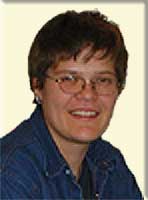KYES STEVENS
 Kyes Stevens is a poet and historian from a itty bitty rural town in Alabama. She works at Auburn University in the Center for the Arts and Humanities, teaching writing in and organizing The Alabama Prsion Arts Initiative. Interests include Depression era rural south, photography, and junctures of race and class within the south.
Kyes Stevens is a poet and historian from a itty bitty rural town in Alabama. She works at Auburn University in the Center for the Arts and Humanities, teaching writing in and organizing The Alabama Prsion Arts Initiative. Interests include Depression era rural south, photography, and junctures of race and class within the south.
Abstract
The Art of Documentary Photography and the Creation of Culture as Seen in Gee's Bend, Alabama
When the Farm Security Administration photographers entered the community of Gee's Bend, Alabama, in the late 1930s, it was not to create art per se; it was to document the success of the New Deal programs implemented there. These were documents of propaganda. But the photos were taken by some of the most skilled photographers of the era, and the result of their creative view into that community is a construction of art. This art represents a significant contribution to the construction of a cultural memory-and significantly, by entities not from that area.
Setting aside the intent of the project and examining the photos of the FSA, interesting questions surface as to what constitutes reality when viewed through someone else's creative sight-and then, how that creative sight builds an understanding of a community, that might in fact be quite limited in scope.
Photography can become too easily manipulated by a myriad of sources. And while there is art that is created to accomplish a certain objective, these photographs were not created as art-and the use of them challenges our understanding of what art is, who creates it, and for what purpose? How does a particular creation affect the growth of community identity, and thus eventually, the community memory?
I have been exploring the creation Gee's Bend by the media through representations in photography. Using the photos of the FSA and the collection of John Reese, I have examined the context in which the documents were created and their affect on a regional and national understanding of Gee's Bend. I have shown that the effects of the photographs still endure, thus perpetuating ideas and understandings that originated during the Great Depression.


